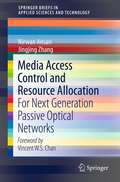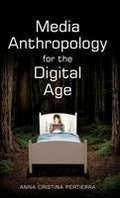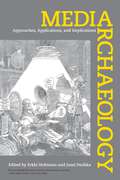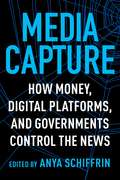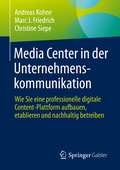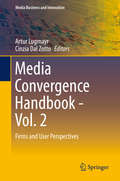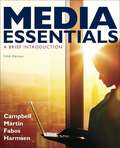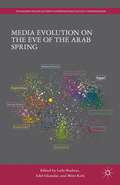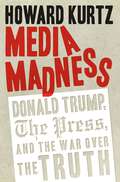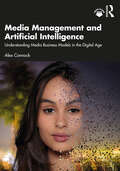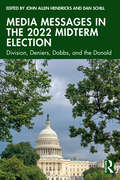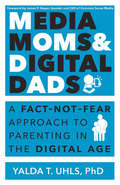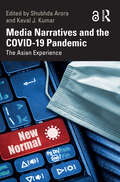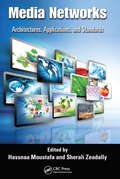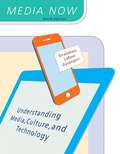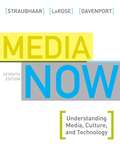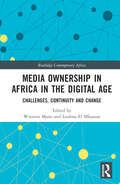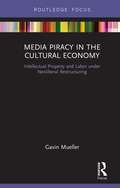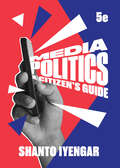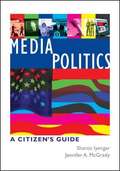- Table View
- List View
Mechatronics—Trending Future Industries (Lecture Notes in Networks and Systems #377)
by Roman Szewczyk Bartosz Powałka Arkadiusz Parus Marcin ChodźkoThis book explains that the coming years undoubtedly bring new developments in mechatronics. These advances are stimulated by the growing demand for intelligent, autonomous solutions in various branches of industry and consumer products. The development of economically justified new mechatronic products is not possible without the ongoing progress in manufacturing technology, metrology, measurements systems, new materials and control techniques. Those are the key for reducing costs and enhancing functionality of new products. Therefore, the scope of the 5th International Conference Mechatronics spanned from advanced mechatronic systems to manufacturing processes. The new results of research in this areas are reported in this book. We strongly believe that the solutions and guidelines presented during the conference held in Szczecin (Poland) from 8th to 10th September 2021 are useful for both researchers and engineers solving problems associated with mechatronic products.
Media & Culture: Mass Communication in a Digital Age (Tenth Edition 2016 Update)
by Richard Campbell Bettina Fabos Christopher R. MartinThe tenth edition of Media & Culture confronts the digital realities of how we consume media--and how students learn in today's classroom. The book shares stories about the history of media, the digital revolution, and ongoing convergence
Media Access Control and Resource Allocation
by Jingjing Zhang Nirwan AnsariThis book focuses on various Passive optical networks (PONs) types, including currently deployed Ethernet PON (EPON) and Gigabit PON (GPON) as well as next generation WDM PON and OFDM PON. Also this book examines the integrated optical and wireless access networks. Concentrating on two issues in these networks: media access control (MAC) and resource allocation. These two problems can greatly affect performances of PONs such as network resource utilization and QoS of end users. Finally this book will discuss various solutions to address the MAC and resource allocation issues in various PON networks.
Media Anthropology for the Digital Age
by Anna PertierraThe field of anthropology took a long time to discover the significance of media in modern culture. In this important new book, Anna Pertierra tells the story of how a field - once firmly associated with the study of esoteric cultures - became a central part of the global study of media and communication. She recounts the rise of anthropological studies of media, the discovery of digital cultures, and the embrace of ethnographic methods by media scholars around the world. Bringing together longstanding debates in sociocultural anthropology with recent innovations in digital cultural research, this book explains how anthropology fits into the story and study of media in the contemporary world. It charts the mutual disinterest and subsequent love affair that has taken place between the fields of anthropology and media studies in order to understand how and why such a transformation has taken place. Moreover, the book shows how the theories and methods of anthropology offer valuable ways to study media from a ground-level perspective and to understand the human experience of media in the digital age. <p><p> Media Anthropology for the Digital Age will be of interest to students and scholars of media and communication, anthropology, and cultural studies, as well as anyone wanting to understand the use of anthropology across wider cultural debates.
Media Archaeology: Approaches, Applications, and Implications
by Erkki Huhtamo Jussi ParikkaThis book introduces an archaeological approach to the study of media - one that sifts through the evidence to learn how media were written about, used, designed, preserved, and sometimes discarded. Edited by Erkki Huhtamo and Jussi Parikka, with contributions from internationally prominent scholars from Europe, North America, and Japan, the essays help us understand how the media that predate today’s interactive, digital forms were in their time contested, adopted and embedded in the everyday. Providing a broad overview of the many historical and theoretical facets of Media Archaeology as an emerging field, the book encourages discussion by presenting a full range of different voices. By revisiting ‘old’ or even ‘dead’ media, it provides a richer horizon for understanding ‘new’ media in their complex and often contradictory roles in contemporary society and culture.
Media Capture: How Money, Digital Platforms, and Governments Control the News
by Edited by Anya SchiffrinWho controls the media today? There are many media systems across the globe that claim to be free yet whose independence has been eroded. As demagogues rise, independent voices have been squeezed out. Corporate-owned media companies that act in the service of power increasingly exercise soft censorship. Tech giants such as Facebook and Google have dramatically changed how people access information, with consequences that are only beginning to be felt.This book features pathbreaking analysis from journalists and academics of the changing nature and peril of media capture—how formerly independent institutions fall under the sway of governments, plutocrats, and corporations. Contributors including Emily Bell, Felix Salmon, Joshua Marshall, Joel Simon, and Nikki Usher analyze diverse cases of media capture worldwide—from the United Kingdom to Turkey to India and beyond—many drawn from firsthand experience. They examine the role played by new media companies and funders, showing how the confluence of the growth of big tech and falling revenues for legacy media has led to new forms of control. Contributions also shed light on how the rise of right-wing populists has catalyzed the crisis of global media. They also chart a way forward, exploring the growing need for a policy response and sustainable models for public-interest investigative journalism. Providing valuable insight into today’s urgent threats to media independence, Media Capture is essential reading for anyone concerned with defending press freedom in the digital age.
Media Center in der Unternehmenskommunikation: Wie Sie eine professionelle digitale Content-Plattform aufbauen, etablieren und nachhaltig betreiben
by Andreas Kohne Marc J. Friedrich Christine SiepeDieses Fachbuch beleuchtet, wie Unternehmen ein professionelles Media Center für ihre externe Kommunikation aufbauen und effektiv nutzen können. Media Center stellen auf Unternehmenswebsites und -microsites umfangreiches Material wie Texte, Bilder, Grafiken, Videos und Audio-Dokumente crossmedial zur Verfügung. Alle Inhalte werden auf individuell definierte Zielgruppen – wie beispielsweise Journalisten, Blogger, Kunden oder Investoren – optimal ausgerichtet. Das Autorenteam beschreibt konkret und praxisnah die verschiedenen strukturellen und organisatorischen Ausprägungen eines Media Centers. Es wird erläutert, welche Prozesse, Tools, Systeme und Experten benötigt werden, um das Unternehmen optimal nach außen zu präsentieren. Zusätzlich wird erläutert, wie es gelingt, selektiv Content aus dem Unternehmen strukturiert zu erfassen, hochwertig medial aufzubereiten und zu positionieren.Mit wertvollen Tipps aus der Praxis und umfangreichen Checklisten für die Implementierung.
Media Compass: A Companion to International Media Landscapes
by Christian Pentzold Aljosha Karim SchapalsAn extensive and inclusive account of the media environments of 45 countries worldwide In Media Compass: A Companion to International Media Landscapes, an international team of prominent scholars examines both long-term media systems and fluctuating trends in media usage around the world. Integrating country-specific summaries and cross-cutting studies of geopolitical regions, this interdisciplinary reference work describes key elements in the political, social, demographic, cultural, and economic conditions of media infrastructures and public communication. Enabling the mapping of media landscapes internationally, Media Compass contains up-to-date empirical surveys of individual countries and regions, as well as cross-country comparisons of particular areas of public communication. 45 entries, each guiding readers from a general summary to a more in-depth discussion of a country’s specific media landscape, address formative conditions and circumstances, historical background and development, current issues and challenges, and more. Designed to facilitate quick lookup of individual entries, as well as comparative readings of a country’s position in the wider media environment, Media Compass: A Companion to International Media Landscapes is an invaluable addition to libraries and institutions of higher education, and a must-read volume for students, educators, scholars, and practitioners working in communication and media studies, journalism, and media production.
Media Convergence Handbook - Vol. 1
by Artur Lugmayr Cinzia Dal ZottoThe Media Convergence Handbook sheds new light on the complexity of media convergence and the related business challenges. Approaching the topic from a managerial, technological as well as end-consumer perspective, it acts as a reference book and educational resource in the field. Media convergence at business level may imply transforming business models and using multiplatform content production and distribution tools. However, it is shown that the implementation of convergence strategies can only succeed when expectations and aspirations of every actor involved are taken into account. Media consumers, content producers and managers face different challenges in the process of media convergence. Volume I of the Media Convergence Handbook encourages an active discourse on media convergence by introducing the concept through general perspective articles and addressing the real-world challenges of conversion in the publishing, broadcasting and social media sectors.
Media Essentials: A Brief Introduction
by Richard Campbell Bettina Fabos Christopher R. Martin Shawn HarmsenA concise resource for the mass communication course, Media Essentials provides a flexible, informative, and relevant breakdown of what the media is, how it works, and how it impacts today’s most talked-about subjects. From #metoo to content streaming to social media and politics, students learn how a wide variety of recent developments have impacted the mass-media landscape--and how past innovation and change have informed our current media world.
Media Events: A Critical Contemporary Approach
by Bianca Mitu Stamatis PoulakidakosMedia Events: A Critical Contemporary Approach proposes an interdisciplinary and multicultural approach of Dayan and Katz's theory of media events (1992) by applying it to contemporary situations. The contributing authors come from a range of countries (UK, USA, Mexico, Germany, Finland, Italy, Greece, Portugal, Ukraine) and analyse the theory of media events from different perspectives, incorporating social media and offering a re-positioning of Dayan and Katz's theory of media events. By bringing new perspectives into this field, the proposed volume is an important contribution as it grounds the intervention and rethinking of the theory into further empirical research. This volume has the potential to function as a 'cross-generational' link between one of the 'early classics' of media and communication studies on the one hand and the present generation of researchers on the other.
Media Evolution On The Eve Of The Arab Spring
by Mimi Kirk Adel Iskandar Leila HudsonMedia Evolution on the Eve of the Arab Spring brings together some of the most celebrated and respected names in Arab media research to reflect on the communication conditions that preceded and made the Arab uprisings possible.
Media Madness: Donald Trump, the Press, and the War over the Truth (Regnery Publishing Ser.)
by Howard Kurtz"‘Defiance Disorder’: Another new book describes chaos in Trump’s White House"–Ashley Parker, Washington Post According to the media, Donald Trump could never become president. Now many are on a mission to prove he shouldn’t be president. The Trump administration and the press are at war—and as in any war, the first casualty has been truth. Bestselling author Howard Kurtz, host of Fox News’s Media Buzz and former Washington Post columnist, offers a stunning exposé of how supposedly objective journalists, alarmed by Trump’s success, have moved into the opposing camp. Kurtz’s exclusive, in-depth, behind-the-scenes interviews with reporters, anchors, and insiders within the Trump White House reveal the unprecedented hostility between the media and the president they cover.In Media Madness, you’ll learn: Why White House strategist Steve Bannon told Trump he is in danger of being impeached How the love-hate relationship between the president and Morning Joe hosts—Joe Scarborough and Mika Brzezinski—turned entirely to hate How Kellyanne Conway felt betrayed by journalists who befriended her—and how she fought backHow elite, mainstream news reporters—named and quoted—openly express their blatant contempt for Trump How Bannon tried to block short-lived Communications Director Anthony Scaramucci—and why Trump soured on himHow Ivanka and Jared Kushner aren’t the liberals the pundits want them to be—and why Trump tried to discourage them from joining the White House Why Trump believes some journalists harbor hatred for him—and how some liberals despise his voters How Trump is a far more pragmatic politician than the press often acknowledges (and how the press dismisses his flip-flops when he flops their way) What Trump got wrong about Charlottesville—and how Steve Bannon predicted the debacle How the media consistently overreached on the Russian “collusion” scandal Why Trump actually likes journalists, secretly meets with them, and allows the press unprecedented access Why Reince Priebus couldn’t do his job—and the real reason he left the White House How Sean Spicer privately berated journalists for bad reporting—and why he and Kellyanne Conway were relentlessly attacked by the mediaNever before has there been such an eye-opening, shocking look at what the White House and the media think about each other. It’s not pretty. But it also makes for the most important political book of the year.
Media Management and Artificial Intelligence: Understanding Media Business Models in the Digital Age
by Alex ConnockThis cutting-edge textbook examines contemporary media business models in the context of Artificial Intelligence (AI) and digital transformation. AI has dramatically impacted media production and distribution, from recommendation engines to synthetic humans, from video-to-text tools to natural language models. "AI is really the change agent of the media industry," answered a natural language generation model when AI was ‘asked’ about the subject of this book. "It will open incredible opportunities." This book seeks to explore them. The media is examined through four sections. ‘Principles’ maps business models and the key tools of AI. ‘Platforms’ covers distribution channels in Games, Streamers, Social Networks, Broadcast and Digital Publishing. ‘Producers’ covers the engines of content-making, including Scripted, Entertainment, Factual, Content Marketing, Creators and Music. Finally, ‘Pioneers’ covers emerging sectors of Podcasting, Esports, the Metaverse and other AI-driven developments. Then in each chapter, a standard value creation model is applied, mapping a single sector through development, production, distribution and monetisation. Diverse case studies are analysed from India, Nigeria, South Korea, South Africa, France, the Netherlands, the US, the UK, Denmark and China – around creative entrepreneurship, revenue models, profit drivers, rights and emerging AI tools. Questions are provided for each case, whilst chapter summaries cement learning. Applied and technology-focused, this text offers core reading for advanced undergraduate and postgraduates studying Media Management – or the relationship between Entertainment, Media and Technology. Online resources include chapter-by-chapter PowerPoint slides and an Instructor’s Manual with further exercises and case studies.
Media Messages in the 2022 Midterm Election: Division, Deniers, Dobbs, and the Donald
by John Allen Hendricks Dan SchillThe 2022 midterms marked a transformative moment in American politics, as the combined influence of legacy media and social platforms reached new heights. Traditional outlets like television news and print journalism set the stage, while a vast digital ecosystem—spanning Facebook, TikTok, YouTube, and more—enabled campaigns to amplify messages on issues like abortion rights, the economy, and immigration. As these platforms shaped the voter experience in a fragmented and often- polarized media environment, campaigns and citizens harnessed their power to reach diverse audiences and build momentum across both established and emerging channels.This book offers a compelling, scholarly exploration of these dynamics, revealing how communication across traditional and digital media shaped an election forecasted as a Republican “red wave” but instead delivered unexpected, narrower results. Through detailed analyses, data- driven research, and case studies from high- profile races, this book uncovers how media strategies influenced voter behavior, shaped public discourse, and framed electoral outcomes. Essential for academics, political analysts, and media professionals, this work provides crucial insights into the evolving role of media in U.S. elections and the weighty implications for future democratic engagement.
Media Moms and Digital Dads: A Fact Not Fear Approach to Parenting in the Digital Age
by Yalda T. UhlsA new media was unleashed upon the world and children took to it like ducks to water. Young people everywhere devoured its content, spending hours upon end immersed in it, while simultaneously ignoring the adults in their lives. Parents were understandably alarmed and worried that this new media was ruining young minds. It may surprise you to know that this new media was not the Internet, radio, or television but rather the 19th-century novel. Yes, parents were concerned that reading too much Jane Austin was going to ruin their children. Fast-forward to today and we are still having the same conversation. Will digital media, in its various forms, ruin our children? In Media Moms & Digital Dads, former film producer turned child psychologist Yalda Uhls cautions parents not to be afraid of the changing state of media but to deal with the realities of how our kids engage with it. The truth is children today spend more time with media than they do with parents or in schools. And as parents, many of us did not have early exposure to the Internet, mobile phones, and gaming, making the world of our children somewhat foreign to us. The key, says Uhls, is to understand the pros and cons of media so that parents can make informed decisions about cause and effect, boundaries and exposure. Uhls debunks the myths around media by delving into the extensive body of social science research, proving that our kids are all right, and that parents can and must adapt to help their children thrive in the digital age. This ground-breaking book will draw back the curtain and reveal the truth-often surprising and counterintuitive, and other times reassuring-in order to help guide the conversation about our digital age and the future of childhood.
Media Narratives and the COVID-19 Pandemic: The Asian Experience
by Shubhda Arora Keval J. KumarThis volume investigates mediated lives and media narratives during the Covid-19 pandemic, with Asia as a focus point. It shows how the pandemic has created an unprecedented situation in this globalized world marked by many disruptions in the social, economic, political, and cultural lives of individuals and communities— creating a ‘new normal’. It explores the different media vocabularies of fear, panic, social distancing, and contagion from across Asian nations. It focuses on the role media played as most nations faced lockdowns and unique challenges during the crisis. From healthcare workers to sex workers, from racism to nationalism, from the plight of migrant workers in news reporting to state propaganda, this book brings critical questions confronting media professionals into focus. The volume is of critical interest to scholars and researchers of media and communication studies, politics, especially political communication, social and public policy, and Asian studies.
Media Narratives and the COVID-19 Pandemic: The Asian Experience
by Shubhda Arora Keval J. KumarThis volume investigates mediated lives and media narratives during the Covid-19 pandemic, with Asia as a focus point. It shows how the pandemic has created an unprecedented situation in this globalized world marked by many disruptions in the social, economic, political, and cultural lives of individuals and communities— creating a ‘new normal’. It explores the different media vocabularies of fear, panic, social distancing, and contagion from across Asian nations. It focuses on the role media played as most nations faced lockdowns and unique challenges during the crisis. From healthcare workers to sex workers, from racism to nationalism, from the plight of migrant workers in news reporting to state propaganda, this book brings critical questions confronting media professionals into focus.The volume is of critical interest to scholars and researchers of media and communication studies, politics, especially political communication, social and public policy, and Asian studies.
Media Networks: Architectures, Applications, and Standards
by Sherali Zeadally Hassnaa MoustafaA rapidly growing number of services and applications along with a dramatic shift in users' consumption models have made media networks an area of increasing importance. Do you know all that you need to know?Supplying you with a clear understanding of the technical and deployment challenges, Media Networks: Architectures, Applications, and Standard
Media Now: Understanding Media, Culture, And Technology (Mindtap Course List Series)
by Joseph Straubhaar Lucinda Davenport Robert LaRoseOffering the most current coverage available, MEDIA NOW: UNDERSTANDING MEDIA, CULTURE, AND TECHNOLOGY, 9e equips readers with a thorough understanding of how media technologies develop, operate, converge, and affect society. The text provides a comprehensive introduction to today's global media environment and ongoing developments in technology, culture, and critical theory that continue to transform the rapidly evolving industry−and impact your daily life. Focusing on the essential history, theories, concepts, and technical knowledge, MEDIA NOW develops readers' media literacy skills to prepare them for work in the expanding fields of the Internet, interactive media, and traditional media industries. In addition to vivid infographics and illustrations, the cutting-edge Ninth Edition includes the latest developments and trends in social media, e-publishing, policy changes for Internet governance, online privacy protection, online ad exchanges, the changing video game industry, and much more.
Media Now: Understanding Media, Culture, and Technology
by Joseph Straubhaar Robert Larose Lucinda DavenportMEDIA NOW, Seventh Edition, empowers you to think critically about the media and its effects on culture by providing a thorough understanding of how media technologies develop, operate, converge, and affect society. MEDIA NOW prepares you for encounters in the expanding fields of the Internet, interactive media, and traditional media industries through engaging, up-to-date material that covers the essential history, theories, concepts, and technical knowledge you need to thrive. Extensively updated in a new sixth edition, MEDIA NOW provides a comprehensive introduction to today's global media environment and ongoing developments in technology, culture, and critical theory that continue to transform this rapidly evolving industry and affect our daily lives.
Media Ownership in Africa in the Digital Age: Challenges, Continuity and Change (Routledge Contemporary Africa)
by Winston Mano Loubna El MkaouarWho owns the media and communications in Africa today and with what implications? The book elegantly answers this urgent question by unpacking multiple dimensions of media ownership through rare and authoritative perspectives, including both historical and contemporary digital developments. It traces the evolving forms of ownership of media and communications in specific African contexts, showing how they interact with broader changes in and outside the continent. The book also shows how Big Techs, such as Meta (formerly known as Facebook), are involved in a scramble for Africa’s digital ecosystem and how their advance brings both opportunities and concerns about ownership and control. The chapters analyse evolving forms of ownership and their implications on media concentration and democracy across Africa. The book offers a nuanced account of how media ownership structures are in some instances captured with an ever-growing and complex ecosystem that also has new opportunities for public interest media. Offering a significant representation of the trends and diversity of existing media systems, the book goes beyond the postcolonial geographical divisions of North and Sub-Saharan Africa to highlight common patterns and significant similarities and differences of communications ownerships between and within African countries. The contributors expose media and communications ownership patterns in Africa that are centralised and yet decentralising and in some cases, battling, resurging and globalising.
Media Piracy in the Cultural Economy: Intellectual Property and Labor Under Neoliberal Restructuring (Routledge Focus on Digital Media and Culture)
by Gavin MuellerThis book takes a Marxist approach to the study of media piracy – the production, distribution, and consumption of media texts in violation of intellectual property laws – to examine its place as an endemic feature of the cultural economy since the rise of the Internet. The author explores media piracy not in terms of its moral or legal failings, or as the inevitable by-product of digital technologies, but as a symptom of a much larger restructuring of cultural labor in the era of the Internet: labor that is digital, entrepreneurial, informal, and even illegal, and increasingly politicized. Sketching the contours of this new political economy while engaging with theories of digital media, both critical and celebratory, Mueller reveals piracy as a submerged social history of the digital world, and potentially the key to its political reimagining. This significant contribution to the study of piracy and digital culture will be vital reading for scholars and students of critical media studies, cultural studies, political theory, or digital humanities, and particularly those researching media piracy, digital labor, the digital economy, and Marxist theory.
Media Politics (Fifth Edition)
by Shanto IyengarA current perspective from a leading scholar This significant revision shows how current issues like the normalizing of “alternative facts,” the management of the COVID-19 crisis, the 2020 election and Trump’s exit from office, and the proliferation of social media fit into a larger understanding of political communication. Shanto Iyengar, a leading scholar in the field, makes contemporary research accessible and engaging with new examples and data throughout. No book illuminates more clearly how media influences politics and how politicians use media to get elected, stay in power, and achieve policy goals. This purchase offers access to the digital ebook only.
Media Politics: A Citizen's Guide
by Shanto Iyengar Jennifer McgradyIyengar and McGrady (Stanford U.) provide a text that discusses the rise of media-based politics in the US, how the media affects American politics, and how politicians use it to their advantage. Campaigning, public relations tactics, and the effects of media on the general public are also detailed. Annotation ©2007 Book News, Inc., Portland, OR (booknews.com)


